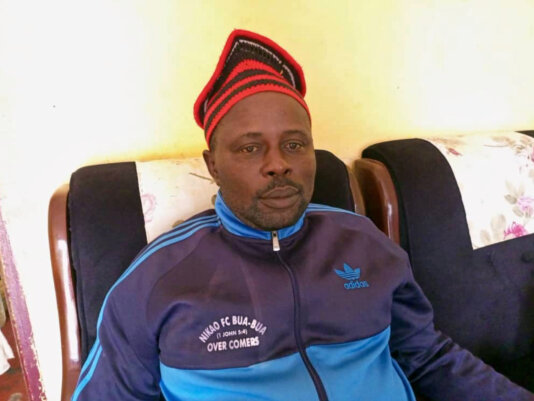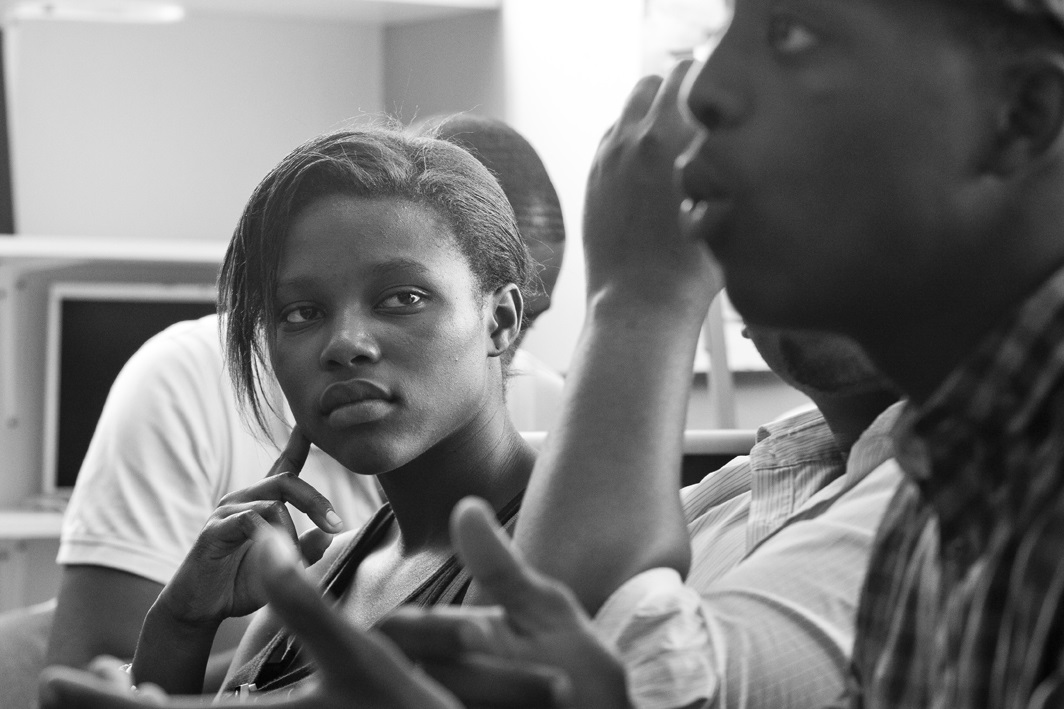- About
- Topics
- Picks
- Audio
- Story
- In-Depth
- Opinion
- News
- Donate
-
Signup for our newsletterOur Editors' Best Picks.Send
Read, Debate: Engage.
| August 23, 2022 | |
|---|---|
| topic: | Natural disaster |
| tags: | #Cameroon, #civil war, #Lake Nyos, #food security |
| located: | Cameroon |
| by: | Isaac Genna Forchie |
Hell broke loose in a small peasant community in North-Western Cameroon on 21 August, 1986 when lethal gas erupted from Lake Nyos - killing nearly 2,000 people including 3,500 animals and thousands of birds.
Following this natural mishap, the few survivors picked up the pieces and set out to rebuild their lives. But their efforts were hampered when the region descended into civil war in 2016.
The Bua-Bua resettlement camp, one of the camps set up for survivors of the natural disaster, was razed down in early 2020 by self-defense groups on a revenge mission against Anglophone rebels seeking a breakaway Cameroonian State.
Some 19 occupants were killed during the raid and thousands fled for safety.
Lake Nyos is located along Cameroon’s volatile volcanic belt. To prevent a repeat of the 1986 tragedy, a degasing process that started in 2001 was completed in 2019.
A local Non-Governmental Organisation, the Bua-Bua Area Development Association (BADA), is working to assuage the plight of survivors who are today torn between the fear of a recurrence of the natural tragedy and attacks from local armed groups.
"We think providing them a potable water source will [reduce] their health issues by half," Denis Kwanga, President of BADA, told FairPlanet.
Kwanga said the idea is to help pre-empt the occurrence of common diseases including typhoid fever, amoebic dysentery, cholera, gastroenteritis and malaria. BADA has rehabilitated a locally conceived water supply system and taps are running again in the resettlement community.
Additionally, the government of Cameroon has established a United Nations-backed plan to rebuild the two battered Anglophone regions, although the initiative has yet to have a substantial impact on the communities.
"We hear the reconstruction plan is ongoing," said Kwanga. "We pray the government will not forget us - who even suffered a triple jeopardy."
He further revealed that BADA is creating contacts and establishing a project to seek funding for the reconstruction of the torched resettlement camp.
As locals anxiously await the impact these projects may have on their livelihoods, eerie echoes of the ongoing civil war and the 1986 gas explosion continue to haunt them.
"The only sound I got that fateful morning of Thursday, 21 August, 1986, was the wailing of a few survivors," recalls Kwanga. He survived the disaster but lost his sister, pregnant mother, cousins and nieces to it.
"It was a cold and chilly evening," Kwanga went on. "We all went to bed with no concerns. Places were as quiet as though the village was a cemetery, not even the chirp of a bird."
Eyewitness accounts said bodies, which were littered all over, were buried in mass and shallow graves in Cha, Su-Bum and Nyos - the affected villages, while the few survivors were rushed to hospitals in nearby towns like Nkambe and Wum.
Over 12,000 survivors were later returned to seven resettlement camps, including Bua-Bua.
Evelyn Bomfuh, 42, a resident Cameroon’s capital Yaounde, also lost her niece to the gas disaster.
"I cook beans and a cornmeal porridge, commonly called pap, and I sell along with gateaux, to make a living," she said.
She runs a household of seven and was forced to double her daily expenses when she hosted four of the 765,000 internally displaced persons who fled the civil war in 2020.
Agnes Tang, 62, had lost her 10-year-old son to the disaster. She then narrowly escaped death when the Bua-Bua camp was destroyed.
"If your relative falls sick and you don't have money to transport him to neighbouring towns, you have no choice but to watch him die slowly," said Tang.
The ongoing civil war in the Anglophone North-West and South-West regions of Cameroon started when Anglophone lawyers and teachers dropped their tools in October 2016 in protest against what they termed "a deliberate attempt" by the central government to wipe out two core cultural values of the Anglophone community in Cameroon: the Common Law and the Anglo-Saxon Sub-System of Education.
In the place of candid talks with leaders of the movement, the government was rather reported to have countered with a fierce crackdown on dissent. The immediate result was an escalation of tension and further clashes that degenerated into a full-blown war.
The conflict is still ongoing, and has led to the killing of some 6,000 people while close to a million others have been rendered homeless.
Thousands of Cameroonian refugees now live in neighbouring Nigeria and face yet another threat from the Boko Haram sect.
A more moderate movement seemed to have been radicalised in 2017 with the arrest of some key secessionist leaders. Those who took over shifted their goals from the reinstatement of the 1961 federal form of government to an outright secession. They now want an independent Anglophone state they call Ambazonia.
Bua-Bua largely depends on agriculture, but abandoned roads continue to pose a severe threat to their trade. As part of the rebuilding scheme, BADA has reconstructed some bridges to connect parts of the camp and to link it with other neighbouring villages and towns for the transportation of farm produce.
The challenge now is the provision of didactic materials to some 2,000 kids in these camps, who are among the 855,000 who were forced to drop out of school because of the war. BADA wants survivors’ kids back in class September 2022, when the next school year begins across Cameroon.
"We learned to live from farming, fishing and other petty businesses," Richard (an alias), a survivor who relocated to Yaounde, lamented. "But the burning of the Bua-Bua resettlement camp in 2020 drove us to the forests, and later to neighbouring villages and towns, where we had to start a new and more expensive life," he added.
Richard was once tortured by government soldiers who suspected him of having links with Anglophone secessionist rebels. He now hawks toilet tissues for a living and is set to return to Bua-Bua.
Image by Espen Røst / Bistandsaktuelt


By copying the embed code below, you agree to adhere to our republishing guidelines.
